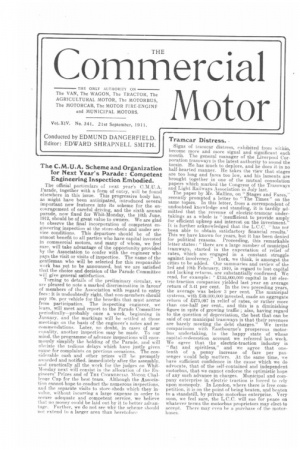The C.M.U.A. Scheme and Organization for Next Year' s Parade : Competent Engineering Inspection Embodied.
Page 1

If you've noticed an error in this article please click here to report it so we can fix it.
The official particulars of next year's C.M.I.T.A. Parade, together with a form of entry, will be found elsewhere in this issue. This progressive body has, as might have been anticipated, introduced several important new features into its scheme for the encouragement of careful driving, and the sixth annual parade, now fixed for Whit-Monday, the 10th June, 1912, should be of great value to owners. We are glad to observe the final incorporation of competent engineering inspection at the store-sheds and under service conditions. This departure should be of the utmost benefit to all parties who have capital invested in commercial motors, and many of whom, we feel sure, will take advantage of the opportunity provided by the Association to confer with the engineer who pays the visit or visits of inspection. The name of the gentleman who will be selected for this responsible work has yet to be announced, but we are satisfied that the choice and decision of the Parade Committee will give general satisfaction.
Turning to details of the preliminary circular, we are pleased to note a marked discrimination in favour' of members of the Association with regard to entry fees: it is undoubtedly right, that non-members should pay 10s. per vehicle for the benefits that must accrue Front participation. The inspecting engineer, we learn, will meet and report to the Parade Committee periodically—probably once a week, beginning in January. and the markings will he settled at those meetings on the basis of the engineer's notes and recommendations. Later, no doubt, in cases of near equality, another inspection may be made. To our mind, the programme of advance inspections will enormously simplify the holding of the Parade, and will obviate the tedious delays which have justly given cause for complaints on previous occasions. The considerable cash and other prizes will be promptly awarded and notified. immediately after the assembly. and practically all the work for the judges on WhitMonday next will consist in the allocation of the Engineers' Prizes and of THE COMMET?OlAT, MOTOR Challenge Cup for the best team. Although the Association cannot hope to conduct the numerous inspections, and the separate visits to store-sheds which they involve. without incurring a large expense in order to secure adequate and competent service, we believe that no money could be laid out by it to better advantage. Further, we do not see why the scheme should net extend to a larger area than heretofore
Tramcar Distress,
Signs of tramcar distress, exhibited front within, become more and more signal and significant each month. The general manager of the Liverpool Corporation tramways is the latest authority to sound the tocsin. He has much to deplore, and he does it in no half-hearted manner. He takes the view that stages are too long and fares too low, and his laments are brought together in one of the mutual consolation papers which marked the Congress of the Tramways and Light Railways Association in July last.
The paper by Mr. Mallins, on "Stages and Fares," recently prompted a letter to "The Times" on the same topics. In this letter, from a correspondent of undoubted knowledge and standing, it is tardily admitted that the revenue of electric-tramcar undertakings as a whole is "insufficient to provide amply for efficient upkeep and interest on the investment." ft is further acknowledged that the L.C.C. " has not been able to obtain satisfactory financial results.' This we have known for years, but it has been denied for political reasons. Proceeding, this remarkable letter states : "there are a large number of municipal tramways, started in the expectation of relief of rates, which are engaged in a constant struggle against insolvency." York, we think, is amongst the cities to be added. Our summaries and review of the 3rd and 10th February, 1910, in regard to lost capital and lacking returns, are substantially confirmed. We read, for example: " it155,000,000 capital in 140 electric-traction companies yielded last year an average return of 3.41 per cent. In the two preceding years, the average was below 3 per cent. The municipal systems, with 249.000,000 invested, made an aggregate return of 2273,097 in relief of rates, or rather more than one-half per cent., and this is a diminishing figure in spite of growing traffic ; also, having regard to the question of depreciation, the best that can be said of our municipal tramways is that their revenues are barely meeting the debt charges." We invite comparisons with Eastbourne's prosperous motorbus undertaking, to the happy state of whose capital-redemption account we referred last week_ We agree that the electric-traction industry is fiat and spiritless," and we agree that onetenth of a penny increase of fare per passenger would help matters. At the same time, we have sufficient confidence in the cause which we do advocate, that of the self-contained and independent motorbus, that we cannot endorse the optimistic hope of any such advance in charges. Municipal and company enterprise in. electric traction is forced to rely upon monopoly. In London, where there is free competition, it is on the point of being beaten, and beaten to a standstill, by private motorbus enterprise. Very soon, we feel sure, the L.C.C. will sue for peace on whatever terms the motorbus proprietors may elect to accept. There may even he a• purchase of the motorbuses.






















